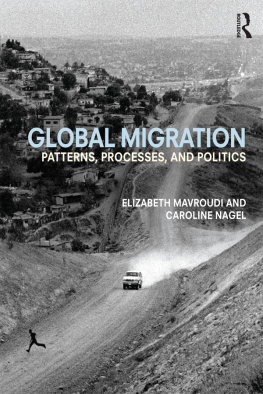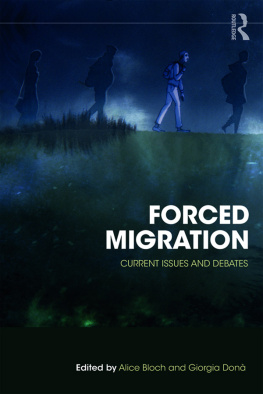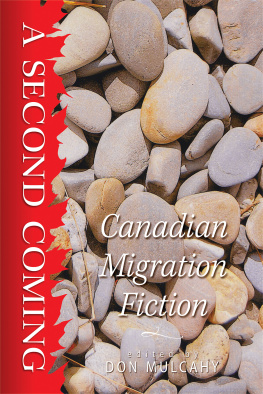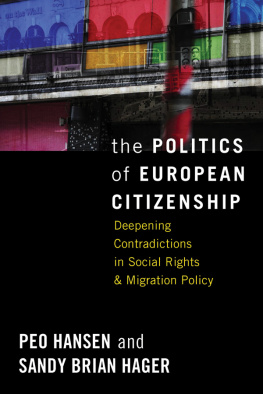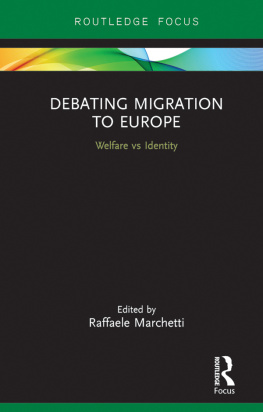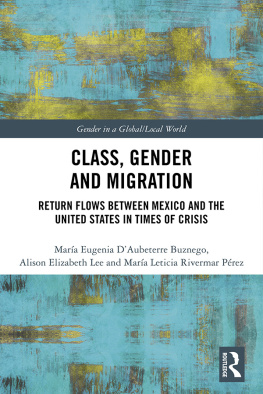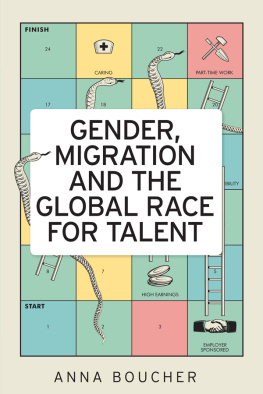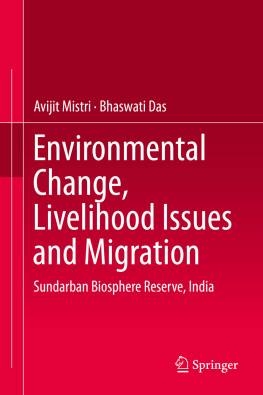GLOBAL MIGRATION
Global Migration provides a clear, concise, and well-organized discussion of historical patterns and contemporary trends of migration, while guiding the reader through an often difficult and politicized topic. Aimed primarily at undergraduate and Masters students, the text encourages the reader to reflect on economic processes, politics, immigrant lives, and raises debates about inclusion, exclusion, and citizenship. The text critically highlights the global character of contemporary migration and the importance of historical context to current processes and emphasizes the role of gender, race, and national ideologies in shaping migration experiences.
Using over a decade of their own insight in teaching undergraduate migration courses in the US and the UK, and the knowledge and understanding of the subject they have acquired as migration researchers, the authors offer an accessible and student-friendly manner for readers to understand and explore the complex issue of migration. The book features numerous international case studies, a chapter dedicated to the perspective of the immigrants themselves, as well as key terms and a list of further readings at the end of each chapter.
Both theoretically and empirically informed, Global Migration examines the subject in an holistic and expansive way. It will equip students with an understanding of the complex issues of migration and serve as a guide for instructors in structuring their courses and in identifying important bodies of scholarly research on migration issues.
Elizabeth Mavroudi is a Lecturer in Human Geography in the Department of Geography at Loughborough University, UK.
Caroline Nagel is an Associate Professor of Geography at the University of South Carolina, USA.
GLOBAL MIGRATION
Patterns, processes, and politics
Elizabeth Mavroudi and
Caroline Nagel

First published 2016
by Routledge
2 Park Square, Milton Park, Abingdon, Oxon OX14 4RN
and by Routledge
711 Third Avenue, New York, NY 10017
Routledge is an imprint of the Taylor & Francis Group, an informa business
2016 Elizabeth Mavroudi and Caroline Nagel
The right of Elizabeth Mavroudi and Caroline Nagel to be identified as authors of this work has been asserted by them in accordance with sections 77 and 78 of the Copyright, Designs and Patents Act 1988.
All rights reserved. No part of this book may be reprinted or reproduced or utilised in any form or by any electronic, mechanical, or other means, now known or hereafter invented, including photocopying and recording, or in any information storage or retrieval system, without permission in writing from the publishers.
Trademark notice: Product or corporate names may be trademarks or registered trademarks, and are used only for identification and explanation without intent to infringe.
British Library Cataloguing in Publication Data
A catalogue record for this book is available from the British Library
Library of Congress Cataloging in Publication Data
Names: Mavroudi, Elizabeth, author. | Nagel, Caroline Rose, author.
Title: Global migration : patterns, processes, and policies / Elizabeth Mavroudi and Caroline Nagel.
Description: Abingdon, Oxon : New York, NY : Routledge, [2016] | Includes bibliographical references and index.
Identifiers: LCCN 2015047341| ISBN 9780415683869 (hardback : alk. paper) | ISBN 9780415683876 (pbk. : alk. paper) | ISBN 9781315623399 (ebook)
Subjects: LCSH: Emigration and immigration. | Emigration and immigrationEconomic aspects | Emigration and immigrationGovernment policy. | ImmigrantsCultural assimilation.
Classification: LCC JV6033 .M38 2016 | DDC 325dc23
LC record available at http://lccn.loc.gov/2015047341
ISBN: 978-0-415-68386-9 (hbk)
ISBN: 978-0-415-68387-6 (pbk)
ISBN: 978-1-315-62339-9 (ebk)
Typeset in Galliard
by Keystroke, Station Road, Codsall, Wolverhampton
To our wonderful daughters, Pippa, Georgia, and Nefeli, who remind us, as only children can, to keep it real.
Contents
This book has its roots in the classroom. We had been teaching courses on global migration for several years at our respective universities when Routledge asked if we might be interested in producing an introductory text on migration. Being familiar with each others research and teaching, we had spoken now and again about writing a book together. Now the opportunity had presented itself to us. We set out to write a book that would explain human migration clearly and concisely to undergraduate students and others new to the field. We have generally followed the order of topics in our course syllabi, and many of the sources cited in the book have been assigned as readings at one time or another to our students. Because this book is so closely tied to our teaching, it seems fitting that we begin by acknowledging the hundreds of students whom we have taughtand who have taught usthrough the years. Our students have typically come to us with no formal background in migration studies, but with a recognition that there is more to migration than what they hear in public discourse. Our students have challenged us when our explanations are unclear and our arguments unconvincing; and they have told us when we have assumed too much or too little about what they know. They have also shared their own migration stories with us. In these ways, our students have made us better teachers and scholars. We hope that our years of student feedback will be apparent in the comprehensiveness and accessibility of this book.
There are many others to whom we owe a debt of gratitude, including those who mentored us in our academic careers and who introduced us to many of the themes and topics addressed in this book. It is not possible for us to provide an exhaustive list here of the scholars who gave us advice, training, and guidance early in our careers, but we would like to recognize Lynn Staeheli and Cheryl McEwan. We would also like to thank our academic colleagues at Loughborough University, the University of South Carolina, and other institutions who have given us feedback on our work over the years and who have developed a good deal of the scholarship that we cite in this book. We give special thanks to Heike Jns, Marco Antonsich, Jon Beaverstock, Tracey Skelton, Anastasia Christou, and Patricia Ehrkamp. Thanks are owed, as well, to the graduate assistants at the University of South CarolinaCatherine Cottrell, Amelia Ayoob, Alysha Baratta, and Beth Nelsonwho assisted with data collection, editing, and the production of tables and graphs, and to Aga Szewczyk, who provided . Caroline would be remiss if she did not thank Sean McCrossin, the owner of Drip Coffee in Columbia, South Carolina, for providing a much-needed refuge from the office and an ideal space for writing.
Special thanks go to Routledge both for inviting us to write this book and for helping to make it a reality. Egle Zigaite and her predecessor, Sarah Gilkes, demonstrated immense patience with us and were always responsive to our queries. We appreciate the faith they placed in us to complete this project.
While we approach migration as scholars, migration is an important part of our own biographies and the biographies of our parents and grandparents. Migration experiencesthe crossing of borders, the maintenance of ties with places of origin, the negotiation of membership in places of settlementare not abstractions to us. Rather, they are woven into the memories and identities of our families. We give thanks to our family members who have shared their stories with us over the years about starting new lives in faraway places.

